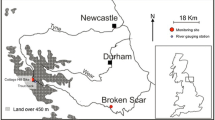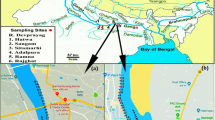Abstract
Peatlands and other terrestrial ecosystems export large amounts of dissolved organic carbon (DOC) to freshwater ecosystems. In catchments used for supplying drinking water, water treatment works (WTWs) can remove large quantities of this organic matter, and can therefore play a unique modifying role in DOC processing and associated greenhouse gas (GHG) emissions within the fluvial system. During this study we quantified the GHG emissions due to processes associated with carbon (C) removal during water treatment at four contrasting WTWs in the UK. Our results demonstrate that the removal of DOC from raw water supplies via coagulation, leading to the formation of sludge, usually makes it less susceptible to short-term oxidation when compared to DOC remaining in the fluvial system. Although this could be considered a means of reducing CO2 emissions from waterborne carbon, the current practise of land spreading of sludge is unlikely to represent a long-term C sink and therefore water treatment probably only delays the rate at which fluvial C re-enters the atmosphere. Furthermore, we estimate that indirect CO2 emissions resulting from electricity use during water treatment, together with the use of chemicals and CO2 degassing from the water during treatment, far outweigh any potential CO2 reductions associated with DOC removal. Thus, the post-treatment handling of sludge has the potential to mitigate, but not to negate, GHG emissions associated with water treatment processes.



Similar content being viewed by others
References
Allpike BP, Heitz A, Joll CA, Kagi RI, Abbt-Braun G, Frimmel FH, Brinkmann T, Her N, Amy G (2005) Size exclusion chromatography to characterize DOC removal in drinking water treatment. Environ Sci Technol 39:2334–2342. doi:10.1021/es0496468
Babatunde AO, Zhao YQ (2007) Constructive approaches toward water treatment works sludge management: an international review of beneficial reuses. Crit Rev Environ Sci Technol 37:129–164. doi:10.1080/10643380600776239
Billett MF, Charman DJ, Clark JM et al (2010) Carbon balance of UK peatlands: current state of knowledge and future research challenges. Clim Res 45:13–29. doi:10.3354/cr00903
Chantigny MH (2003) Dissolved and water-extractable organic matter in soils: a review on the influence of land use and management practices. Geoderma 113:357–380. doi:10.1016/S0016-7061(02)00370-1
Cory RM, Ward CP, Crump BC, Kling GW (2014) Sunlight controls water column processing of carbon in arctic fresh waters. Science 345:925–928. doi:10.1126/science.1253119
Dawson JJC, Billett MF, Neal C, Hill S (2002) A comparison of particulate, dissolved and gaseous carbon in two contrasting upland streams in the UK. J Hydrol 257:226–246. doi:10.1016/S0022-1694(01)00545-5
Dawson JJC, Soulsby C, Tetzlaff D et al (2008) Influence of hydrology and seasonality on DOC exports from three contrasting upland catchments. Biogeochemistry 90:93–113. doi:10.1007/s10533-008-9234-3
Dawson JJC, Tetzlaff D, Speed M et al (2011) Seasonal controls on DOC dynamics in nested upland catchments in NE Scotland. Hydrol Process 25:1647–1658. doi:10.1002/hyp.7925
DEFRA (2008) Future water: the government’s water strategy for England. Report Cm 7319. Available from: https://www.gov.uk/government/uploads/system/uploads/attachment_data/file/69346/pb13562-future-water-080204.pdf. Accessed 27 Dec 2014
DEFRA (2012) 2012 Guidelines to Defra/DECC’s GHG conversion factors for company reporting: methodology paper for emission factors. report PB 13792. Available from: https://www.gov.uk/government/uploads/system/uploads/attachment_data/file/69568/pb13792-emission-factor-methodology-paper-120706.pdf. Accessed 19 Dec 2014
Dunn C, Hughes DD, Jones TG, et al (2014) Measurement of small-scale trace gas fluxes from peat samples. Pedosphere, accepted
DWI (2014) Drinking water 2013; a report by the Chief Inspector of Drinking Water. Available from: http://dwi.defra.gov.uk/about/annual-report/2013/. Accessed 27 Dec 2014
Freeman C, Evans CD, Monteith DT et al (2001a) Export of organic carbon from peat soils. Nature 412:785. doi:10.1038/35090628
Freeman C, Ostle N, Kang H (2001b) An enzymic “latch” on a global carbon store. Nature 409:149. doi:10.1038/35051650
Friedrich E (2002) Life-cycle assessment as an environmental management tool in the production of potable water. Water Sci Technol J Int Assoc Water Pollut Res 46:29–36
Friedrich E, Pillay S, Buckley C (2007) The use of LCA in the water industry and the case for an environmental performance indicator. Water SA 33:443–451
Griffiths-Sattenspiel B, Wilson W (2009) The Carbon footprint of water. River Network, Portland
Helm D, Ainger C, Butler D et al (2009) A low carbon water industry in 2050. Environment Agency, Bristol, UK. Available from https://www.gov.uk/government/uploads/system/uploads/attachment_data/file/291635/scho1209brob-e-e.pdf. Accessed 10 Dec 2014
Hope D, Billett MF, Cresser MS (1994) A review of the export of carbon in river water: fluxes and processes. Environ Pollut 84:301–324. doi:10.1016/0269-7491(94)90142-2
Kechavarzi C, Dawson Q, Bartlett M, Leeds-Harrison PB (2010) The role of soil moisture, temperature and nutrient amendment on CO2 efflux from agricultural peat soil microcosms. Geoderma 154:203–210. doi:10.1016/j.geoderma.2009.02.018
Monteith DT, Stoddard JL, Evans CD et al (2007) Dissolved organic carbon trends resulting from changes in atmospheric deposition chemistry. Nature 450:537–540. doi:10.1038/nature06316
Moody CS, Worrall F, Evans CD, Jones TG (2013) The rate of loss of dissolved organic carbon (DOC) through a catchment. J Hydrol 492:139–150. doi:10.1016/j.jhydrol.2013.03.016
Nayar S, Chou LM (2003) Relative efficiencies of different filters in retaining phytoplankton for pigment and productivity studies. Estuar Coast Shelf Sci 58:241–248. doi:10.1016/S0272-7714(03)00075-1
Northern Ireland Water (2014) Annual Report and Accounts, 2013/14. North Ireland Water, Belfast, UK. Available from: https://www.niwater.com/annual-report/. Accessed 27 Dec 2014
Racoviceanu AI, Karney BW, Kennedy CA, Colombo AF (2007) Life-cycle energy use and greenhouse gas emissions inventory for water treatment systems. J Infrastruct Syst 13:261–270. doi:10.1061/(ASCE)1076-0342(2007)13:4(261)
Rothausen SGSA, Conway D (2011) Greenhouse-gas emissions from energy use in the water sector. Nat Clim Change 1:210–219. doi:10.1038/NCLIMATE1147
Santana MVE, Zhang Q, Mihelcic JR (2014) Influence of water quality on the embodied energy of drinking water treatment. Environ Sci Technol 48:3084–3091. doi:10.1021/es404300y
Scottish Water (2014) Annual Report and Accounts, 2013/14. Scottish Water, Dunfermline, UK. Available from: http://www.scottishwater.co.uk/about-us/publications/key-publications/scottish-water-annual-report-2013-14. Accessed 27 Dec 2014
Stokes JR, Horvath A (2009) Energy and air emission effects of water supply. Environ Sci Technol 43:2680–2687. doi:10.1021/es801802h
Stokes J, Horvath A (2011) Life-cycle assessment of urban water provision: tool and case study in California. J Infrastruct Syst 17:15–24. doi:10.1061/(ASCE)IS.1943-555X.0000036
Tarantini M, Ferri F (2001) LCA of drinking and wastewater treatment systems of Bologna City: Final results. Proceedings of the 4th Inter-Regional Conference on Environmental Water
UKWIR (2010) Energy Efficiency in the UK Water Industry: A Compendium of Best Practices and case studies—global report. Report 10/CL/11/3. Available from: http://www.ongov.net/mwb/carerfp/documents/%28Q%29%20WRF_Energy%20Efficiency%20Best%20Practices_4270.pdf. Accessed 28 Dec 2014
Vince F, Aoustin E, Bréant P, Marechal F (2008) LCA tool for the environmental evaluation of potable water production. Desalination 220:37–56. doi:10.1016/j.desal.2007.01.021
Von Arnold K, Nilsson M, Hanell B et al (2005) Fluxes of CO2, CH4 and N2O from drained organic soils in deciduous forests. Soil Biol Biochem 37:1059–1071. doi:10.1016/j.soilbio.2004.11.004
Westermann P (1993) Temperature regulation of methanogenesis in Wetlands. Chemosphere 26:321–328. doi:10.1016/0045-6535(93)90428-8
Acknowledgments
This project was funded by DEFRA (project number SP1205). We are grateful to Phillippa Pearson and Alex Herridge at Welsh Water and Nicola Barton at United Utilities for providing data, David Taylor at Ecoganix for arranging access to sludge stockpiles and staff at each WTW for their help during sampling.
Author information
Authors and Affiliations
Corresponding author
Additional information
This article is part of the special issue ‘Carbon Cycling in Aquatic Ecosystems’.
Rights and permissions
About this article
Cite this article
Jones, T.G., Evans, C.D. & Freeman, C. The greenhouse gas (GHG) emissions associated with aquatic carbon removal during drinking water treatment. Aquat Sci 78, 561–572 (2016). https://doi.org/10.1007/s00027-015-0458-8
Received:
Accepted:
Published:
Issue Date:
DOI: https://doi.org/10.1007/s00027-015-0458-8




